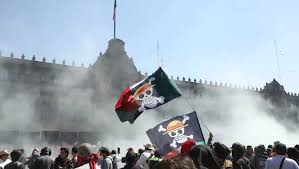
Breaking News
 Is Global Technocracy Inevitable Or Dangerously Delusional?
Is Global Technocracy Inevitable Or Dangerously Delusional?
 Grand Theft World Podcast 261 | THE EPSTEIN EMAIL SHOW with guest Billy Ray Valentine
Grand Theft World Podcast 261 | THE EPSTEIN EMAIL SHOW with guest Billy Ray Valentine
 Mexico's 'Gen Z rebellion' exposed as viral right-wing plot
Mexico's 'Gen Z rebellion' exposed as viral right-wing plot
 Let Neighborhoods Work: Bans on Home Businesses Are Out of Control
Let Neighborhoods Work: Bans on Home Businesses Are Out of Control
Top Tech News
 New Gel Regrows Dental Enamel–Which Humans Cannot Do–and Could Revolutionize Tooth Care
New Gel Regrows Dental Enamel–Which Humans Cannot Do–and Could Revolutionize Tooth Care
 Researchers want to drop lab grown brains into video games
Researchers want to drop lab grown brains into video games
 Scientists achieve breakthrough in Quantum satellite uplink
Scientists achieve breakthrough in Quantum satellite uplink
 Blue Origin New Glenn 2 Next Launch and How Many Launches in 2026 and 2027
Blue Origin New Glenn 2 Next Launch and How Many Launches in 2026 and 2027
 China's thorium reactor aims to fuse power and parity
China's thorium reactor aims to fuse power and parity
 Ancient way to create penicillin, a medicine from ancient era
Ancient way to create penicillin, a medicine from ancient era
 Goodbye, Cavities? Scientists Just Found a Way to Regrow Tooth Enamel
Goodbye, Cavities? Scientists Just Found a Way to Regrow Tooth Enamel
 Scientists Say They've Figured Out How to Transcribe Your Thoughts From an MRI Scan
Scientists Say They've Figured Out How to Transcribe Your Thoughts From an MRI Scan
 Calling Dr. Grok. Can AI Do Better than Your Primary Physician?
Calling Dr. Grok. Can AI Do Better than Your Primary Physician?
Mexico's 'Gen Z rebellion' exposed as viral right-wing plot

Those findings were amplified by Mexican President Claudia Sheinbaum, who has questioned what role Mexico's cartel-linked opposition parties and foreign meddling may have played in inflaming so-called "Gen Z" protests on November 15. The demonstrations left around 120 people injured – over 100 of them police officers, according to a statement from authorities.
The Infodemia report traced the astroturfed movement's origins to a shadowy nexus of previously apolitical social media influencers, Mexican opposition figures, and wealthy oligarchs, who are accused of subsidizing the chaos to the tune of 90 million pesos (approximately $5 million USD). Among the chief organizers was a wealthy young influencer named Carlos Bello; Mexico's most infamous serial tax cheat, Ricardo Salinas Pliego; and the operators of anonymous social media accounts which mysteriously attracted hundreds of thousands of followers on Twitter/X, Instagram, and TikTok in just a handful of weeks.
In early October, the 31-year-old Bello instantly transformed from a lifestyle influencer flashing cash and showing off sports cars to a political lightning rod after he slammed the Mexican government and exhorted young audience members to "assert your rights" during a forum organized by the Chamber of Deputies. In a rhetorical style clearly aimed at channeling Donald Trump, Bello mixed banal observations that the government had grown out of touch with the demands of everyday people with right wing pablum about the need for a successful "businessman" like himself to reinvigorate the system. The message was republished by Pliego, who emerged as a vitriolic opponent of the Mexican government after it ordered his Grupo Salinas conglomerate to pay over 50 billion pesos ($2.6 billion dollars) in back taxes.
Bello insisted he was neither affiliated with the ruling Morena party nor "PRIAN" – a reference to the ossified pro-establishment PRI and PAN parties which ruled Mexico for nearly 90 years before Morena was swept to power in a landslide election won by former president Andrés Manuel López Obrador in 2018. Yet just two weeks later, Bello began to promote Alessandra Rojo, a mayor from Cuauhtémoc who belongs to the PRIAN's successor party, Strength and Heart for Mexico.
It was Bello who first announced on October 12 that a "march" was being organized and that the date had already been set. "They don't have the power," Bello declared in a TikTok post, while displaying video of the Mexican legislature. "All of us have the power, and Mexico needs us to demonstrate that today more than ever."
Though his speech had "woken up many Mexicans," Bello insisted that "we can't limit ourselves to words alone," and concluded that "now is the time for the next step."
The very same day, an account with the name "Mexican Revolutionaries" was opened on TikTok. Four days later, on Oct. 16th, the Mexican Revolutionaries page published the first call for demonstrations to take place on November 15th. That same week, another account which was central to the violent protest, "We Are Generation Z Mexico," held a live broadcast promoting the demonstrations which was immediately shared by Henrique 'Kike' Mireles, a spokesman for the PAN party in the state of Querétaro.
These calls to action were quickly amplified by a range of accounts which Infodemia researchers singled out for exhibiting inauthentic behavior. They pointed specifically to dozens of accounts which had single-digit follower counts and were only created in October or November of 2025.

 Unbanked In A Connected World
Unbanked In A Connected World

